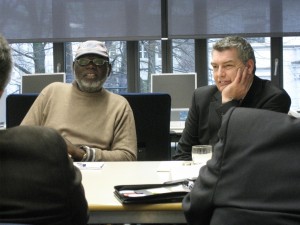Struggle for press freedom in Zimbabwe
Hopes for greater press freedom in Zimbabwe grew when a power-sharing government was formed following the elections in 2008. The new government has however not lived up to the expectations of many people in the media industry. The DW-AKADEMIE will host a conference on Media Training and Capacity Building Needs in Harare on February 25.
To gain an insight into the current press situation we spoke to the Zimbabwean media expert, Luckson Chipare, who coordinates the DW-AKADEMIE media development project in Zimbabwe.

L. Chipare with DW-AKADEMIE's P. Leusch Bonn
We keep hearing bad news about press freedom in Zimbabwe. How exactly is the government trying to hinder the media and journalists?
Luckson Chipare: They do it on many stages! We have very bad media legislation. We have laws that really militate against media freedom in Zimbabwe. And then they’re using those laws at a practical level to actually deny citizens freedom of the media and the freedom to communicate. In most cases you find that access to media is very limited. Zimbabwe is one of the very few countries in the region that do not have alternative media besides the state broadcast media. That denies ordinary citizens to watch or hear alternative news. And it gets worse because the government-controlled media are very one-sided.
How would describe the situation for print media in Zimbabwe?
Luckson Chipare: There has always been a sprinkling of independent print media. Those that are there have suffered under the same draconian laws as those that have been closed down. But some survived, because they quickly registered at the time when these laws were introduced in 2002. Some of them were de-registered because of small misdeamanors. For example, the law requires them to indicate changes in directorship and one of them didn’t do that and so they were de-registered. Then of course, the famous Daily News was closed down. At the same time in 2010, the Zimbabwe Media Commission gave licenses to four new newspapers.
How much freedom do Zimbabwe’s independent newspapers have in criticizing the government?
Luckson Chipare: They are fairly independent but they do get into problems as well. Only a few months ago, one of the journalists working for The Standard was arrested. He spent 19 days in detention and then the editor of The Standard was arrested and spent a night in detention for a story that they published. They do report as independently as they can and they suffer the consequences from time to time when they get arrested and detained. I would imagine that they are exercising self-censorship in fear of getting arrested – that is always hanging over their head. On the other hand, there’s also the economics of running a newspaper. And it’s becoming more and more difficult. The country’s economics are quite bad. If the average person’s salary is US$150 per month, can they spare money to buy a newspaper? So, the circulation of newspapers is coming down constantly. Therefore people are denied access to reading newspapers.
To what extent is social media such as Twitter or blogs an option for journalists to express their opinion?
Luckson Chipare: It’s an option but given the economic situation not many people access social media. Social media is likely being used in the sense of “social”. There is a Zimbabwean diaspora all over the world. People use it to communicate but nothing really significant in terms of “media” is issued. We have some blogs and online media from people in the diaspora. But in Zimbabwe people would not spent a lot of money to get on the internet to read stories published by journalists in the diaspora.
What would you wish for as a first step to improve press freedom?
Luckson Chipare: The first important step would be the licensing of community radio stations and the licensing of private radio and television stations. I think there’s a lot of scope for Zimbabweans to actually do that. I imagine that most of the exile media that we have would love to operate broadcasting media from Zimbabwe and be able to reach audiences in Zimbabwe. Manpower to do this would definitely be there!
Interview by Christine Harjes




Feedback